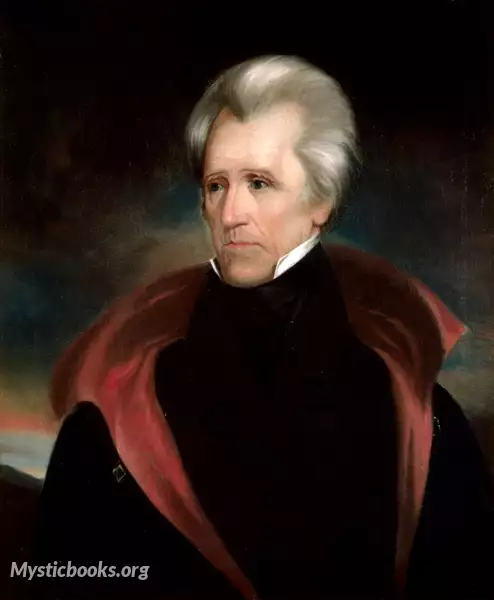
Timeline
Title
Country/Nationality
Andrew Jackson
Andrew Jackson was an American lawyer, general, and statesman who served as the 7th president of the United States from 1829 to 1837. Before being elected to the presidency, Jackson gained fame as a general in the United States Army and served in both houses of the U.S. Congress. An expansionist president, Jackson sought to advance the rights of the "common man" against a "corrupt aristocracy" and to preserve the Union.
Born in the colonial Carolinas in the decade before the American Revolutionary War, Jackson became a frontier lawyer and married Rachel Donelson Robards. He served briefly in the United States House of Representatives and the United States Senate, representing Tennessee. After resigning, he served as a justice on the Tennessee Supreme Court from 1798 until 1804. Jackson purchased a property later known as The Hermitage, and became a wealthy, slaveowning planter. In 1801, he was appointed colonel of the Tennessee militia and was elected its commander the following year. He led troops during the Creek War of 1813–1814, winning the Battle of Horseshoe Bend. The subsequent Treaty of Fort Jackson required the Creek surrender of vast lands in present-day Alabama and Georgia. In the concurrent war against the British, Jackson's victory in 1815 at the Battle of New Orleans made him a national hero. Jackson then led U.S. forces in the First Seminole War, which led to the annexation of Florida from Spain. Jackson briefly served as Florida's first territorial governor before returning to the Senate. He ran for president in 1824, winning a plurality of the popular and electoral vote. As no candidate won an electoral majority, the House of Representatives elected John Quincy Adams in a contingent election. In reaction to the alleged "corrupt bargain" between Adams and Henry Clay and the ambitious agenda of President Adams, Jackson's supporters founded the Democratic Party.
Jackson ran again in 1828, defeating Adams in a landslide. Jackson faced the threat of secession by South Carolina over what opponents called the "Tariff of Abominations". The crisis was defused when the tariff was amended, and Jackson threatened the use of military force if South Carolina attempted to secede. In Congress, Henry Clay led the effort to reauthorize the Second Bank of the United States. Jackson, regarding the Bank as a corrupt institution that benefited the wealthy at the expense of ordinary Americans, vetoed the renewal of its charter. After a lengthy struggle, Jackson and his allies thoroughly dismantled the Bank. In 1835, Jackson became the only president to completely pay off the national debt, fulfilling a longtime goal. While Jackson pursued numerous reforms designed to eliminate waste and corruption, his presidency marked the beginning of the ascendancy of the party "spoils system" in American politics. In 1830, Jackson signed the Indian Removal Act, which forcibly removed most members of the major tribes of the Southeast to Indian Territory; these removals were subsequently known as the Trail of Tears. The relocation process dispossessed these nations of their land and resulted in widespread death and disease. Jackson opposed the abolitionist movement, which grew stronger in his second term. In foreign affairs, Jackson's administration concluded a "most favored nation" treaty with the United Kingdom, settled claims of damages against France from the Napoleonic Wars, and recognized the Republic of Texas. In January 1835, he survived the first assassination attempt on a sitting president.
In his retirement, Jackson remained active in Democratic Party politics, supporting the presidencies of Martin Van Buren and James K. Polk. Though fearful of its effects on the slavery debate, Jackson advocated the annexation of Texas, which was accomplished shortly before his death. Jackson has been widely revered in the United States as an advocate for democracy and the common man. Many of his actions proved divisive, garnering both fervent support and strong opposition from many in the country. His reputation has suffered since the 1970s, largely due to his anti-abolitionist views and policy of the forcible removal of Native Americans from their ancestral homelands. However, surveys of historians and scholars have ranked Jackson favorably among U.S. presidents.
Andrew Jackson was born on March 15, 1767, in the Waxhaws region of the Carolinas. His parents were Scots-Irish colonists Andrew Jackson and his wife Elizabeth Hutchinson, Presbyterians who had emigrated from Ulster, Ireland, two years earlier. Jackson's father was born in Carrickfergus, County Antrim, around 1738. Jackson's parental ancestors crossed into Northern Ireland from Scotland after the Battle of the Boyne in 1690.
When they migrated to North America in 1765, Jackson's parents brought two children with them from Ireland, Hugh (born 1763) and Robert (born 1764). The family probably landed in Philadelphia. Most likely they traveled overland through the Appalachian Mountains to the Scots-Irish community in the Waxhaws, straddling the border between North and South Carolina. Jackson's father died in February 1767 at the age of 29, in a logging accident while clearing land, three weeks before his son Andrew was born. Jackson, his mother, and his brothers lived with Jackson's aunt and uncle in the Waxhaws region.
Jackson's exact birthplace is unclear because of a lack of knowledge of his mother's actions immediately following her husband's funeral. The area was so remote that the border between North and South Carolina had not been officially surveyed. In 1824, Jackson wrote a letter saying he had been born on the plantation of his uncle James Crawford in Lancaster County, South Carolina. Jackson may have claimed to be a South Carolinian because the state was considering nullification of the Tariff of 1824, which he opposed. In the mid-1850s, second-hand evidence indicated that he might have been born at a different uncle's home in North Carolina. As a young boy, Jackson was easily offended and was considered something of a bully. He was, however, also said to have taken a group of younger and weaker boys under his wing and been kind to them.
Books by Andrew Jackson

Andrew Jackson's State of the Union Addresses
The State of the Union address is a speech presented by the President of the United States to a joint session of the United States Congress, typically delivered annually. The address not only reports on the condition of the nation but also allows the...

Robert O'Hara Burke and the Australian Exploring Expedition of 1860
A non-fictional account of Burke and Wills's 1860 expedition to cross the Australian continent from south to north and then return. Containing many excerpts from the diaries and accounts of the explorers, this book was published the year after the ex...

State of the Union Addresses by United States Presidents (1829 - 1836)
This book contains a collection of Andrew Jackson's State of the Union addresses delivered to Congress between 1829 and 1836. These speeches provide insights into the political and social landscape of the United States during Jackson's presidency. Th...